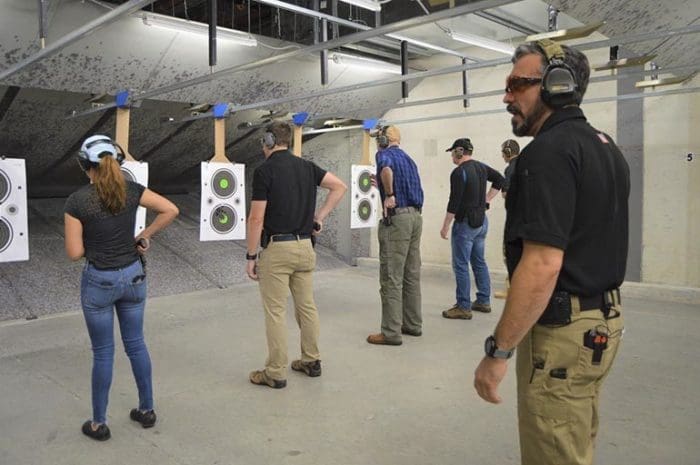The subject of formal firearms training tends to be a rather controversial one at times. After all, isn’t a gun just a point and shoot tool? What do you really need to know other than that? Why pursue formal firearms training? Here’s my perspective as a gun owner who carries daily and has chosen to pursue formal training to improve my skills.
If you just buy a gun for home defense and put it into a kitchen drawer or nightstand, maybe you can make a good argument that you don’t need training. Personally, I still think it’s a good idea to have some lessons and get in a range session at least once a month with that firearm. Here’s why:
—You need to make sure your gun works. That’s the simplest reason but also the most essential. If you never load it, fire it or clean it, there’s no guarantee it’s going to work the moment that you need it most.
—You need to make sure you can handle the gun. If you own more gun with different manuals of arms, that could work against you in a defensive situation. If you have limited strength or dexterity, there are all kinds of guns available now for small to large and weak to strong hands. It’s important to be sure the gun you’re relying on is one you can actually use.
—Training and practice accustom you to the mindset you need in order to hold a gun and defend yourself.
That said, I don’t know that a person who owns a gun solely for home defense has to do these things. I just happen to think they’re a good idea, based on range sessions where a friend has shown up with a gun he “hasn’t shot in a while” that was sitting in a kitchen drawer and it malfunctioned, he couldn’t load or fire it reliably, or something similar. A gun is a tool and just like any other tool, it needs to be run, cleaned, lubed and inspected once in a while.
When you decide to carry concealed, it’s a whole other ball game in some respects. Some of this depends on where you live. If you’re in a rural environment where there are very few people and you’re mostly driving around on back roads in your truck, maybe you don’t need formal training other than knowing how to operate the gun and making sure it works. I would say the need for formal training goes up another level every time you add another layer of potential “non-targets” to the environment in which you carry the gun.
I live in a dense urban area. What that means is that even stepping out my door in the morning takes me right into a busy environment crawling with dogs, scooters, people walking, baby carriers, cars, motorcycles, and kids running around. It’s always that way, so that’s the environment I’m always going to be carrying in. Since I live in a dense urban neighborhood the houses are close together, not spread apart. People are out, going to work, shopping, eating, doing life.
As a conceal carrier in such an environment, something I have to think about is the density of that environment everywhere outside of my home. SIMS training really showed me how easy it is to make mistakes with a firearm that can be lethal to people who are not the bad guy.
It’s much more important in a dense urban area to be accurate and effective should you ever have to deploy a firearm for self defense. In an urban setting you also deal with things like panhandlers, clusters of people high on drugs, and ill-intentioned folk who pair up to mug you or rob your house. In short, you have to prepare to deal with potentially more than one assailant and do it in an environment surrounded by other people.
All of these factors are what made me decide to choose formal firearms training – that and being introduced to the shooting world by friends who are instructors and insisted on it. In general, in choosing a training course, I select courses that involve no fewer than 350 rounds fired during the course, and preferably 500 rounds per course day. I’ve found that round count tends to be more the standard in the courses that have really improved my skills for marksmanship and response time.
I choose courses where there’s a good instructor-student ratio, maybe one instructor to 5-8 students. Too many students and not enough teachers create a potentially dangerous environment where you may be working on new skills with a loaded firearm and there aren’t enough instructors to keep an eye on everyone and maintain a safe setting. Having more teachers also allows you to get help if you’re having a special struggle with your gun or the drill. They can have someone step aside and help you without impeding the rest of the class.
I also tend to avoid courses that are overly “tacticool” and that rent guns to participants. Do you really want to be in a low light class with someone renting a gun who’s probably never held that (or possibly any) firearm before? I don’t. I’m just saying.
There are a lot of great firearms courses out there today and I hope this helps you find the one that’s right for you if you choose to pursue formal firearms training. What courses have you taken and what do you look for in a firearms instructor?
